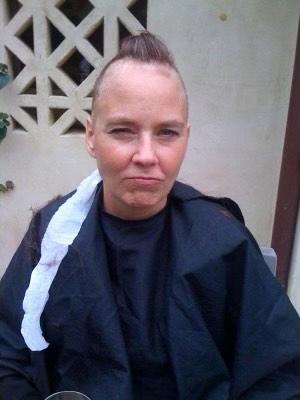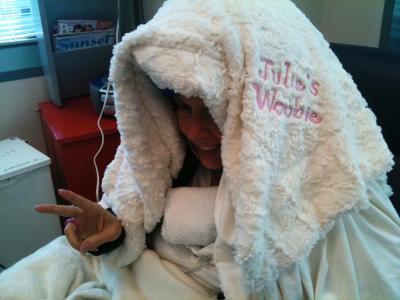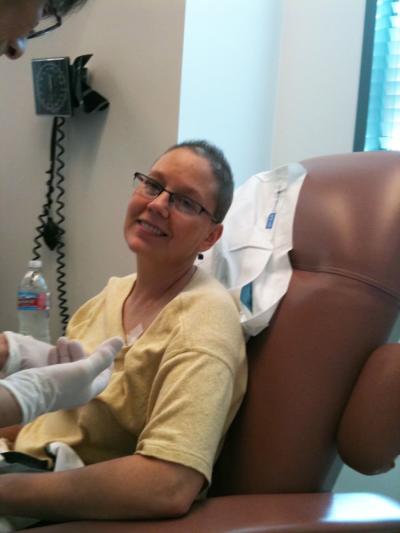The most vulnerable thing I’ve ever written

I’m going to be totally vulnerable with this post as a plea to anyone who will read it. Before now I’ve only shared this with a handful of people in my life because, frankly, I’ve felt too ashamed, too stupid, too embarrassed and very selfish.
At the beginning of 2009, I went in for my annual medical exam — you know, the type where you get all the parts of your female body checked from top to bottom. As my doctor was doing my breast exam, he said that something about my right breast didn’t feel right. He said it was most likely nothing, but that I should get it checked out as soon as possible.
I was 39. It was January. I thought, meh, it’s nothing. I was young, ate super clean, ran marathons once and sometimes twice a year for a full decade, hiked like a beast. I was a multi-sport all-state athlete and was way too busy with my job. I confidently thought that bad stuff like this really only happened either to people who weren’t concerned about their health or older people — at least that’s what I told myself.
Our then-CEO unexpectedly departed Best Friends Animal Society and I was suddenly the designated liaison between our board of directors and our staff and senior leadership team. This appointment lasted almost a full year while the organization searched for a new CEO. The economy was in the toilet from the mortgage crisis, and I was concerned about the financial health of the organization and keeping our lifesaving mission moving in the right direction. I was working nonstop, and my life was generally insane. In my mind, I didn’t need or have time for additional tests or health concerns.
I compartmentalized Dr. Bowman’s words into the back of my head and put it out of my mind. A diagnosis like this wasn’t possible for someone as healthy as me. I waited nearly a year and finally took it seriously later that December.
I went in for further testing and a biopsy revealed a massive tumor. Although it was still undetectable to the novice hand, it was a baseball-sized tumor that mimicked a spider web. My cancer was no longer containable; it was at an advanced stage and hyper-aggressive.
My surgeon at UCLA didn’t mince words. She declared that my tumor was, in her words, the scariest and most aggressive she’d seen that year. My category of care suddenly became different. I was officially assigned to one of the most brilliant oncologists, whose ward of cancer patients, well, most likely didn’t stand a chance. In fact, I met a rotating line-up of fellow cancer patients during infusion treatments who I never saw again. And at an advanced treatment facility like UCLA, this was not comforting.
Thus began years of struggling to survive, and years and years of recovery and rehabilitation. The chemo and radiation treatment were brutal, as well as the further clinical trial I participated in for two years at MD Anderson in Houston. During this time my physical body was ravaged, and so too was my state of mind. The thought of cancer was always there. A specter looming ready to pounce. Was it coming back? I was certain that every ache and pain was cancer. My oncologist, under no uncertain terms, made it clear that if I had a recurrence, I was a goner. It was everything they say about cancer treatment: what brings you to the brink of death can save your life.
Survival, however, was far from the end of the struggle. The aftermath was as difficult, if not more, than the treatment itself, and I learned that no one really guides you through that. The prolonged high-dose steroid treatment, change of body image and severe weight gain that accompanied the effects of treatment, the extreme exhaustion, the impairing brain fog, the savage loss of range of motion due to four surgeries and 39 rounds of radiation, the permanent peripheral neuropathy (I could go on ... it’s a long list) remained for years. But most debilitating was coming to grips with a loss of womanhood and identity. Even after most of the physical pain faded, this was, and in many ways remains, an ongoing challenge.



I often reflect on this time and wonder, what if? Given the aggressive growth rate of my cancer, what if I’d gone in to get further testing when Dr. Bowman suggested it? How would my outcome have been different if I’d acted earlier? Would it have saved me years of struggle and the extreme loss of self? Would it have prevented me from very nearly losing my life? At the end of the day, I’ll never know the answers to these questions, but I do know that I am extraordinarily fortunate to be here, on this earth, savoring every moment as if it were my last urgent one.
I never, ever want cancer to define me, and it never will. But hear this: October is Breast Cancer Awareness Month. There is nothing more important than your health. I implore every woman reading this to get effing screened. I implore every partner who loves a woman to drag them in to get effing checked. I implore dear friends or relatives to encourage their loved ones to get their annual mammogram and to do self-examinations on a regular basis. And don’t make the same mistake I did. Don’t assume that something “suspicious” or something that “maybe we should watch” isn’t serious. Follow up, take the next step, get certainty that what “probably” isn’t something serious really isn’t something serious.
I was putting everything and everyone before me, which is only admirable to a point. I thought this was a noble, unselfish act, but it was incredibly self-centered of me to not understand what this would put my loved ones and the organization through. You can never be too busy for your health.
I never really understood the saying “If you don’t have your health, you don’t have anything.” Sure, I understood it in theory, but certainly not in practice. Sometimes, you need to drop everything and put yourself first. Otherwise, what’s the point of everything you’re devoted to? If you need to take a break, life continues. I promise. But if you’re gone, that’s it.
Cancer is an opportunist. It doesn’t care who you are, what you do, or where you live.
I was one tick away from being terminal. Do not be like me. Do not be cavalier about something suspicious regarding your health or body. Do not wait and face a diagnosis that can result in years and years and years of painful recovery or, worse, death.
I feel stupid and arrogant, ashamed and selfish that I didn’t go in for further tests when a medical professional advised me to. I feel guilty for everything I put my friends and family through. But I am so grateful that I’m still here with all of you, and that we can continue our journey doing whatever we can to make this world a better place. I want all of my fellow women to be here, alongside me, sharing life’s journey, too.
